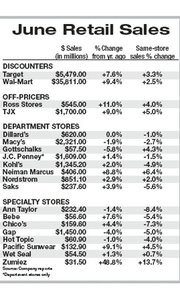Slow and Steady Wins the Day for Retailers in June '07
Analysts were expecting June to be a sluggish month for sales, yet many forecasts were beaten when retailers reported their monthly sales results on July 11. However, they did not beat the forecasts by much.
A statement from the International Council of Shopping Centers called June’s growth “steady.” The New York–based ICSC charted a 2.4 percent increase for retail sales based on its index of 50 chain stores. The shopping- center industry trade group originally forecast a weak 1.5 percent to 2 percent sales growth for the month.
While ICSC chief economist Michael Niemira conceded the month’s sales improved, he acknowledged that sales have slowed down this year. “We believe that a ’consumer soft patch’ began in February 2007, and the latest data suggested it continued through June,” Niemira said.
According to the ICSC’s index, apparel retail stores reported a decrease of 0.5 percent. Department stores reported a decrease of 2.5 percent, and luxury stores reported an increase of 0.3 percent.
Luxury stores Nordstrom and Neiman Marcus posted gains in their comparable sales, which were 2 percent and 6.4 percent, respectively. Macy’s, which formally changed its name from Federated Department Stores recently, reported a decrease of 2.7 percent.
American Eagle Outfitters posted same-store sales gains of 8 percent. Surf was up for Anaheim, Calif.–based Pacific Sunwear and Everett, Wash.–based Zumiez. The teen-focused surf and skate retailers posted comparable-store gains of 4.5 percent and 13.7 percent, respectively.
Hot Topic, based in City of Industry, Calif., reported a decline of 4 percent. But the decline beat forecasts, according to Liz Pierce, an analyst for Roth Capital Partners, based in Newport Beach, Calif.
According to a research note published on July 12, she wrote that the mall-based teen store was forecast to report declines of 6 percent to 9 percent. She believed that beating the forecast should prove that Hot Topic is on the road to better health. “Comps were driven by more full-price sales and less by marked-down merchandise,” she wrote.—Andrew Asch






















